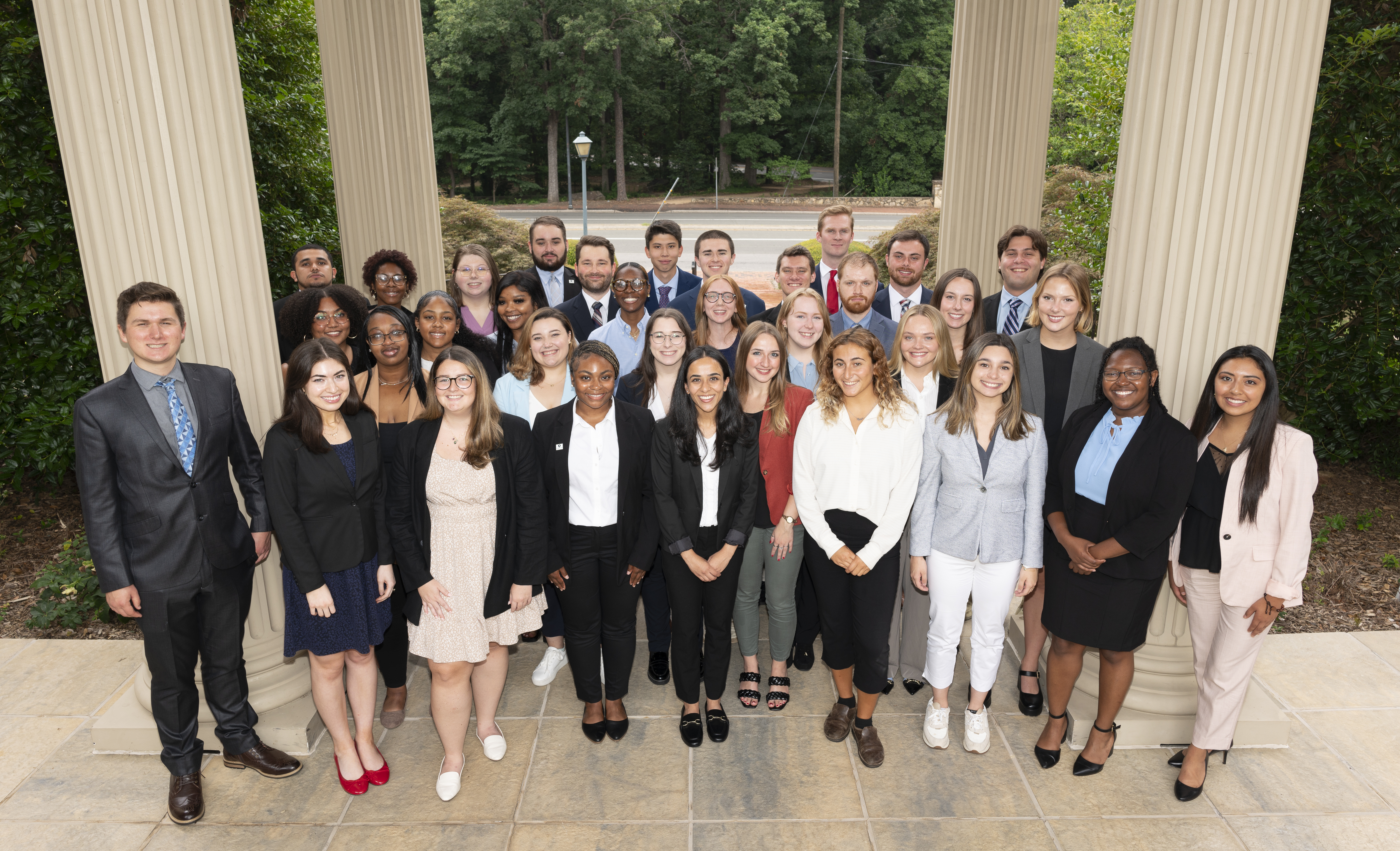LFNC Fellows Program Celebrates Fifth Year, Fifth Cohort of Future Leaders
July 2023 brought the fifth cohort of Lead for North Carolina Fellows to the UNC School of Government to begin their journey into public sector careers. Cohort Five began its work in August after completing training in July.
Lead for North Carolina (LFNC) aims to recruit, train, and place young leaders in paid local government fellowships as a means of strengthening public institutions, supporting local communities, and cultivating a new generation of public service leaders.
Addressing local government needs
Now entering its fifth year, the program is looking to the future and ways to address the most pressing concerns local governments face today.
“There has been an unprecedented investment into communities via grant dollars from the federal government, which brings extra capacity concerns in finance offices—particularly in distressed communities,” said Dylan Russell, director of LFNC.
This year, the program is piloting a finance-specific track for Fellows with more finance training to help local governments address capacity constraints in their finance departments. Fellows will assist with everything from accounts payable, to internal controls, to updating policies and procedures.
“We saw an overwhelming number of local governments express interest and are excited to launch a track focused solely on meeting the financial needs and concerns of local governments,” said Russell.
Forty-four percent of Fellows in the fifth cohort are participating in the new finance-specific track.
Learnings and highlights from the past five years
“The first year, we had to work hard to convince local governments that a recent college graduate could be a value-add for their jurisdiction as a new program. We identified sixteen local government partners who agreed to co-pilot the program with the School and our philanthropic partners,” said Russell. “This past year, we had eighty-two governments apply to host a Fellow—the largest application cycle to-date.”
The demand from local governments to participate in the program has increased and proves the value that Fellows bring to communities across the state. The program also benefits Fellows by providing training and exposure to new career paths.
“To see the number of young people who did not have local government careers on their radar be convinced of the transformative work you can do in this field and pursue it after the program has been inspiring,” said Russell.
To-date, twenty program alums are working for local government in some way after having completed the program. Another twenty alums are either attending or planning to attend graduate school for subjects related to the field such as public policy, public affairs, and planning.
Key Funders
LFNC has had crucial support from funders who have helped shape and support the program throughout its five years.
One such funder is the SECU Foundation, which has offered support both financially and as an advisor for the development of the program’s model. “The SECU Foundation—from their board members, foundation staff, corporation staff, and community advisor boards—have been so supportive and influential to the program’s success. It is not an understatement to say this program would not exist without their continuous support,” said Russell.
AmeriCorps began funding during the third year of the program, which unlocked federal government benefits for participants, offered more support for the Fellows, and boosted recruitment for the program.
The support of Anonymous Trust allowed the program to prioritize working in rural and underserved communities in eastern North Carolina.
The support of the Z. Smith Reynolds Foundation has also been incredibly valuable through every year of the program.
Other key funders include State Farm, Wells Fargo, Jesse Ball Dupont Fund, and the Golden LEAF Foundation.
Host sites
The fifth cohort of Fellows will join thirty-six host sites. The complete list of Fellows and host sites for Cohort Five is below:
Payton Blaney – Bladen County
Eva Davis – Buncombe County
Adrienne Stacy – Cary
Nick Warnement – Catawba County
Gracie Ruebel – Chadbourn
Divya Mehta – Chatham County
Sarah Dhunjishaw – City of Marion
Emily Martin – City of Raleigh
Talula Flower Dechev – Columbus County
Isaac Jones – Enfield
Aanyah “Nyah” Sykes – Goldsboro
Abby Kimmel – Greenville & Pitt County
Alyssa Wadham – Hickory
Marshall Grayson – Hillsborough
Brittany Wilborn – Hometown Strong
Seth Moore – Hyde County
Quentin Riddell – Jacksonville
Brittany Best – Kinston
Kennedy Young – Land of Sky Regional Council
Suzy Brito Lagunas – Lee County
Ruby Klein – NC League of Municipalities
Ania Hairston – NC League of Municipalities
Tyler Holden – North Wilkesboro
Kirsten Tucker – Rockingham County
Alex Curry – Southwest Commission
Ryan Ledbetter – Spencer
Albaro Raul Reyes-Martinez – City of Kannapolis
Emiyah Watkins – City of Lowell
Faith Gray – Town of Angier
LaShonda Sousa – UNC School of Government
Ryan Bullard – Topsail Beach
Emily Saunders – Town of Apex
Antonia (Tonia) Christou – Town of Ranlo
Tyler Queen – Triangle J Council of Governments
Asia Shanelle Melton – Washington County
Ryan Oathout – Wendell
Published March 28, 2023



